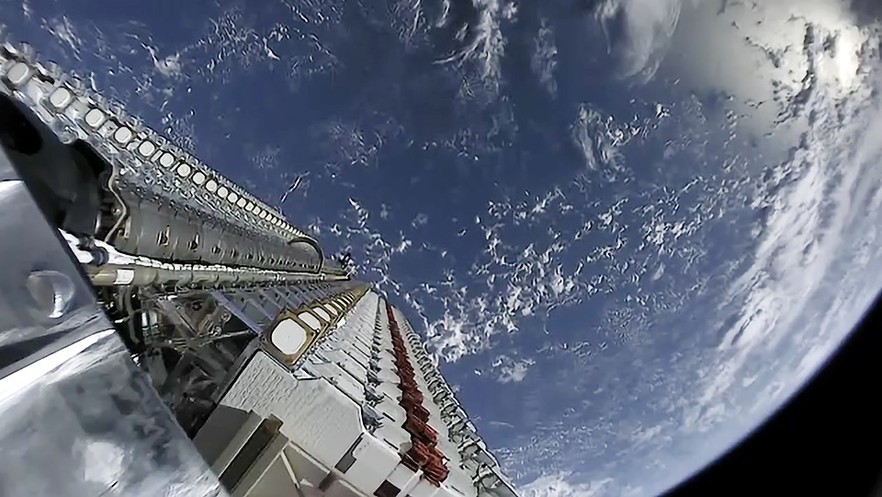Lesotho gives in, approves Starlink licence
Civic organisation says this is a “sell-out”
A batch of Starlink test satellites stacked atop a Falcon 9 rocket. Photo: Official SpaceX photos via Wikimedia (public domain)
- The Lesotho Communications Authority has approved Starlink’s application to provide satellite internet services.
- The announcement comes in the middle of uncertainty about the tariffs to be imposed on the country by US President Donald Trump.
- Civic organisation Section Two says this is a “sell-out”.
Lesotho has succumbed to pressure and granted a ten-year licence to Starlink Lesotho, a subsidiary of Elon Musk’s SpaceX, to operate a satellite internet network in Lesotho. This follows an announcement by Prime Minister Samuel Matekane earlier this month that his government would remove barriers to US investment, in the midst of a tariff onslaught.
On 2 April, US President Donald Trump imposed a 50% tariff on imports from Lesotho — the highest among all affected countries — threatening up to 12,000 jobs in factories that export to the US under the African Growth and Opportunity Act (AGOA). He later paused the 50% tariff for 90 days. But this still leaves in place a 10% tariff that came into effect on 5 April.
The Lesotho Communications Authority (LCA) announced on Monday that its board of directors had approved Starlink’s application to provide satellite internet services across the country.
The LCA said this was a milestone in Lesotho’s digital transformation and a commitment to building a competitive, transparent, and innovative communications sector. “The approval of the operating licence clears the path for the Authority to finalise the terms and conditions under which Starlink Lesotho will provide satellite internet services to individuals and businesses across Lesotho,” the LCA said in a statement.
Kananelo Noloetse, coordinator of civic organisation Section Two, said the LCA’s decision was “a betrayal.”
“Such actions can only be described as a betrayal — a shameful sell-out by a government that appears increasingly willing to place foreign corporate interests above the democratic will and long-term developmental needs of the people of Lesotho,” Boloetse said.
“At this critical juncture, while Section Two continues to seek further information regarding this deeply concerning development, we express our profound dismay at the decision by the LCA to grant a licence to Starlink to operate a satellite network and provide internet services in the country.”
He said the decision was made “despite Section Two’s well-documented opposition, echoed by several key stakeholders in the communications sector, who raised serious and legitimate concerns”.
Chief among those concerns is the fact that Starlink Lesotho is 100% foreign-owned. Boloetse argued that this should have weighed heavily in a licensing process designed to safeguard national interests and promote inclusive local participation.
“By proceeding with this decision, the LCA has not only disregarded the valid objections of local stakeholders but has also compromised the integrity and credibility of the regulatory process,” he said.
Existing telecom companies in Lesotho have substantial local ownership.
But the LCA said all comments from public consultations had been shared with Starlink Lesotho, “which responded to each submission”. The Authority had then compiled a comprehensive report for final deliberation by its Board.
Speaking to GroundUp last week, LCA Public Affairs Manager Mothepane Kotele emphasised the importance of public participation. “The LCA has just finished reviewing the comments and is currently engaging with those who contributed to understand the context,” she said.
However, Section Two said it had not been consulted by the LCA after submitting its formal opposition to the granting of the licence. Asked for further comment, Kotele did not respond to questions.
Boloetse also referred to a report by an American publication that claimed Lesotho authorities had given prior assurances to the United States government that Starlink would be licensed by 15 April 2025.
“This revelation exposes a deeply troubling lack of transparency and suggests that key decisions affecting our national communications infrastructure may have been predetermined and subject to foreign influence,” Boloetse said. “It calls into question the independence of the LCA and the commitment of our government to the principles of good governance and national sovereignty.”
Support independent journalism
Donate using Payfast

Don't miss out on the latest news
We respect your privacy, and promise we won't spam you.
Next: Police can’t say why they let an alleged rapist off the hook
Previous: Play commemorates 10th anniversary of Rhodes Must Fall movement
© 2025 GroundUp. This article is licensed under a Creative Commons Attribution-NoDerivatives 4.0 International License.
You may republish this article, so long as you credit the authors and GroundUp, and do not change the text. Please include a link back to the original article.
We put an invisible pixel in the article so that we can count traffic to republishers. All analytics tools are solely on our servers. We do not give our logs to any third party. Logs are deleted after two weeks. We do not use any IP address identifying information except to count regional traffic. We are solely interested in counting hits, not tracking users. If you republish, please do not delete the invisible pixel.

